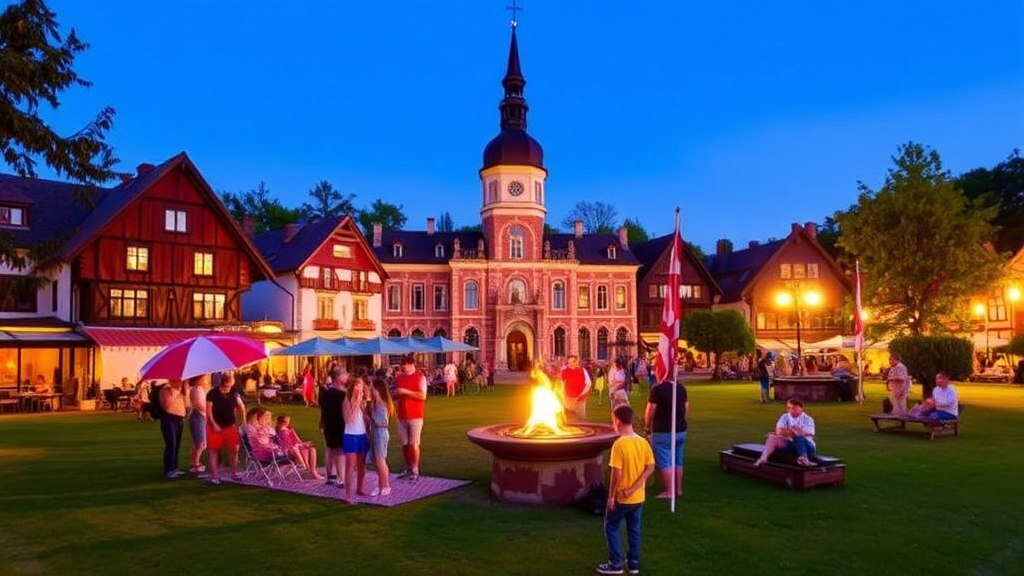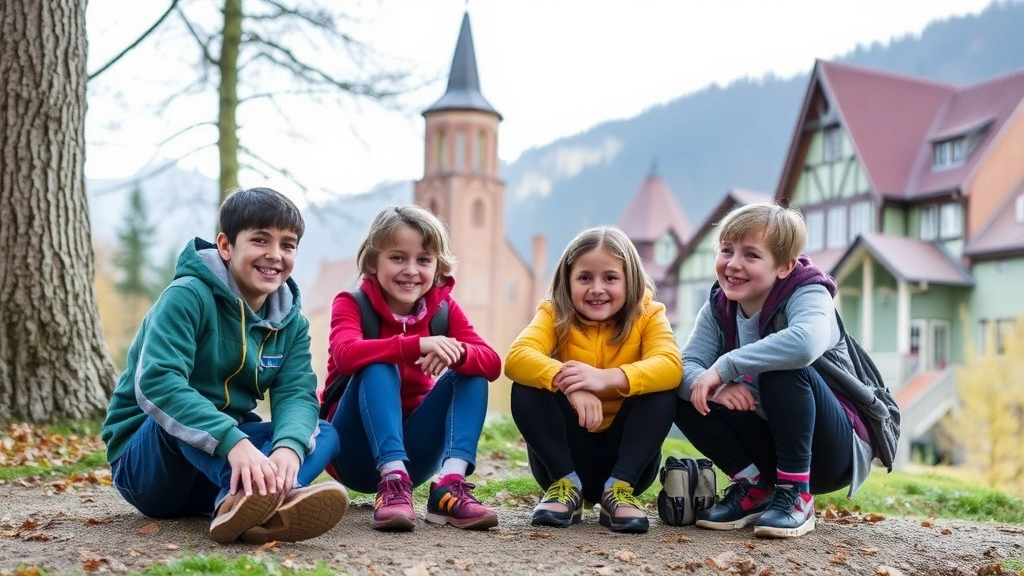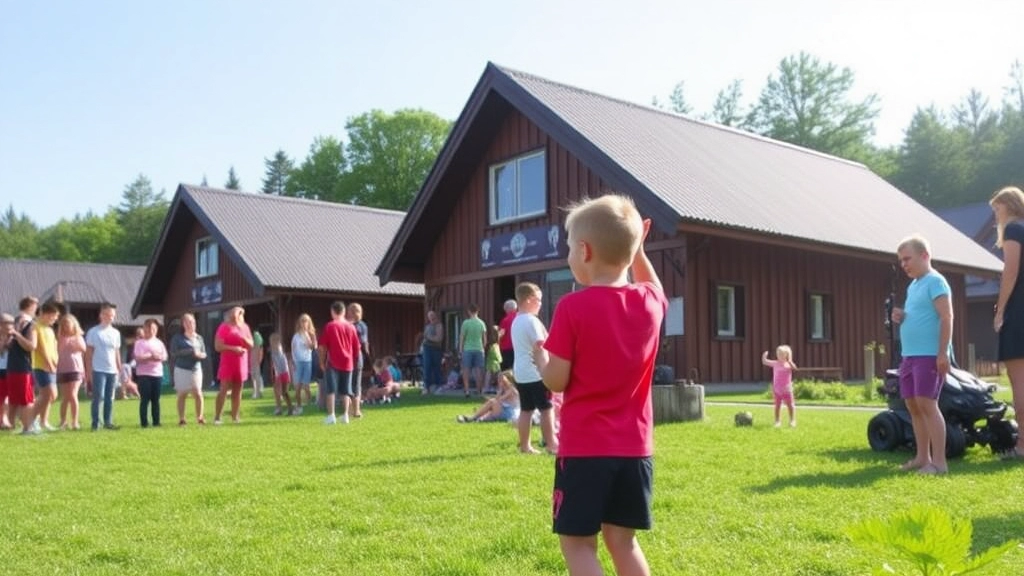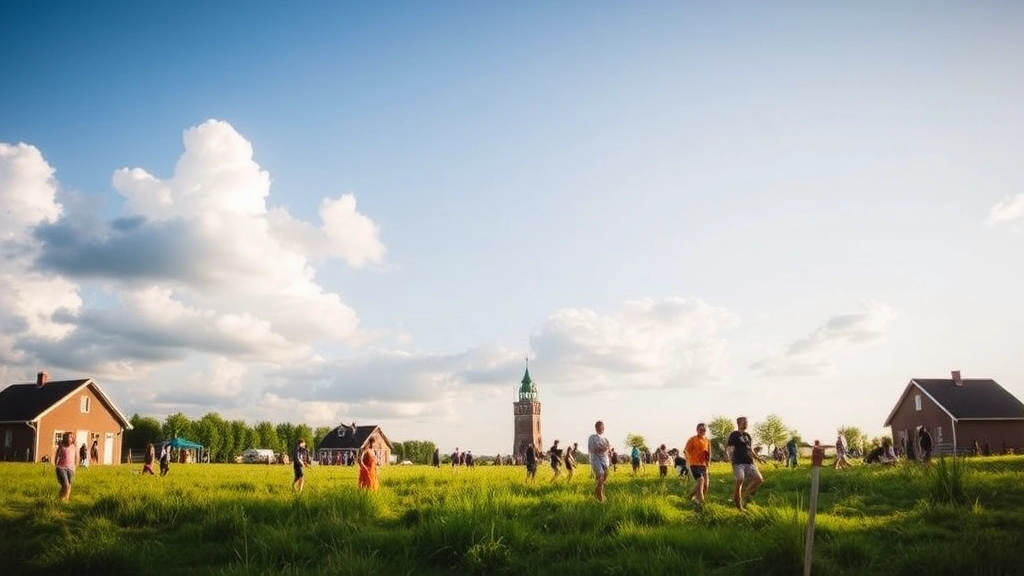German Summer Camps: A Fun Way to Learn
Looking for an exciting way for your child to learn German this summer? A German Summer Camp might be just what you need. These camps offer kids and teens the chance to immerse themselves in the German language while enjoying a mix of cultural activities, sports, and excursions. It’s a perfect blend of education and fun, making language learning an unforgettable experience.
Why Choose a German Summer Camp?
German Summer Camps are spread across various beautiful locations, each offering unique programs tailored to different age groups. Whether your child is a beginner or already has some knowledge of German, these camps provide an ideal environment to boost their language skills. Plus, they get to make new friends from around the world and explore the rich German culture firsthand.
Ready to Find Out More?
Let’s dive into the details!
Types of German Summer Camps Available
Alright, let’s dive in. You’re probably wondering, âWhat types of German summer camps are out there for my kid?â Good question. There’s a whole buffet of options, and I’m here to break it down for you in a way that’s as easy to digest as your morning coffee.
Language Immersion Camps
First up, we’ve got Language Immersion Camps. These are the bread and butter of German summer camps. The main focus here? Getting your child to speak, think, and even dream in German. They’ll be surrounded by the language 24/7, which means faster learning and better retention.
Features:
- Daily language classes: Structured lessons with native speakers.
- Conversational practice: Real-life scenarios to practice speaking.
- Language games: Fun activities that make learning engaging.
Sports and Adventure Camps
Next on the list are Sports and Adventure Camps. If your kid’s got energy to burn, this is the way to go. These camps mix language learning with physical activities. Think of it as killing two birds with one stone.
Highlights:
- Outdoor activities: Hiking, climbing, and water sports.
- Team sports: Football, basketball, and more.
- Adventure challenges: Obstacle courses and survival skills.
Arts and Creativity Camps
Got a budding artist at home? Arts and Creativity Camps focus on the creative side of things. Your child will not only learn German but also get to explore their artistic talents.
What to Expect:
- Art classes: Painting, drawing, and sculpture.
- Drama workshops: Theatre and improvisation.
- Music sessions: Instruments and singing.
STEM Camps
For the little Einsteins out there, STEM Camps are a fantastic option. These camps combine German language learning with science, technology, engineering, and maths. It’s a win-win.
Key Elements:
- Science experiments: Hands-on learning.
- Tech projects: Coding and robotics.
- Math challenges: Problem-solving activities.
Cultural Exchange Camps
Last but definitely not least, we have Cultural Exchange Camps. These camps are all about immersing your child in the German way of life. They’ll get to experience the culture first-hand while making friends from around the world.
Main Attractions:
- Cultural workshops: Cooking, history, and traditions.
- Excursions: Visits to museums, historical sites, and local attractions.
- Social activities: Group outings and cultural festivals.
How to Choose?
So, how do you pick the right camp? Think about your child’s interests and goals. Are they keen on sports, arts, or science? Do they need a full-on language immersion experience? Whatever their passion, there’s a German summer camp out there that’s a perfect fit.
Quick Tips:
- Identify interests: Match the camp type with your child’s hobbies.
- Set goals: Decide what you want your child to achieve.
- Research: Look for reviews and testimonials.
In the end, the best camp is the one that will keep your child engaged and excited about learning. Trust me, the right choice can make all the difference.
Popular Locations for German Summer Camps

Ever wondered where the best spots for German summer camps are?
Let’s dive into it.
Berlin: The Heartbeat of Germany
Berlin is a top choice.
Why?
- Rich History: Think museums, historical sites, and a vibrant arts scene.
- Diverse Culture: You’ll find a mix of old and new, making it a great place for kids to learn and explore.
- Modern Facilities: Camps here often have top-notch amenities.
Berlin isn’t just a city; it’s an experience.
Munich: Where Tradition Meets Modernity
Munich is another fantastic option.
Here’s why:
- Beautiful Parks: Perfect for outdoor activities.
- Cultural Festivals: Kids can enjoy traditional Bavarian events.
- Safe and Clean: Parents can feel at ease.
Imagine your child learning German while soaking in the Bavarian culture. Sounds ideal, right?
Hamburg: The Maritime Marvel
Hamburg offers something unique.
Think:
- Port City Vibes: The harbour is bustling with activity.
- Water Sports: Great for kids who love being on the water.
- Historic Sites: Plenty to explore and learn from.
Hamburg is perfect for those who love a mix of city life and water-based activities.
Frankfurt: The Financial Hub
Frankfurt might surprise you as a summer camp location.
But it’s got perks:
- Skyline Views: A modern city with a stunning skyline.
- Museums and Galleries: Plenty of educational opportunities.
- International Environment: Great for meeting people from all over the world.
Frankfurt is where modernity meets tradition.
The Bavarian Alps: Nature at its Best
If your child loves the outdoors, consider the Bavarian Alps.
Why?
- Stunning Scenery: Think mountains, lakes, and forests.
- Outdoor Activities: Hiking, climbing, and more.
- Fresh Air: Perfect for a healthy, active summer.
Nothing beats learning German while surrounded by nature.
Cologne: The Cultural Hub
Cologne is a gem for summer camps.
Here’s what it offers:
- Historic Cathedrals: A city rich in history.
- Music and Arts: A vibrant cultural scene.
- Friendly Locals: A welcoming atmosphere.
Cologne is all about culture and community.
So, What’s the Best Location?
It boils down to what you and your child are looking for.
- History Buffs: Berlin or Cologne.
- Nature Lovers: Bavarian Alps.
- Modern City Feel: Frankfurt or Munich.
- Water Enthusiasts: Hamburg.
Each location has its unique charm.
Age Groups and Target Audiences for German Camps
Alright, let’s dive into the nitty-gritty of who these German summer camps are actually for.
Who’s Signing Up for German Camps?
Parents, you might be wondering: Is this camp right for my kid? Will they fit in? These are real concerns, and I get it. So let’s break it down.
Age Groups
First off, German summer camps cater to a wide range of age groups. Here’s a quick rundown:
- Young Children (6-10 years old): These camps are usually more about fun and less about intense language learning. Think games, crafts, and basic German phrases.
- Tweens (11-13 years old): At this age, kids are ready for a bit more structure. Camps for tweens often include more educational activities, but still with plenty of fun.
- Teens (14-17 years old): Here’s where things get serious. Camps for teens often focus on more immersive language learning and cultural experiences. They might even have some academic components.
- Young Adults (18-21 years old): Yes, there are camps for young adults too! These are often more specialised, focusing on advanced language skills or even career-related experiences.
Target Audiences
Now, who exactly is the target audience for these camps? Here’s a snapshot:
- Beginners: Kids who are just starting to learn German. These camps focus on basic vocabulary and phrases.
- Intermediate Learners: Those who know the basics but want to improve. Camps for intermediate learners often include more conversational practice.
- Advanced Learners: Teens and young adults who are already pretty good at German but want to get even better. These camps might include advanced grammar, literature, and even exam preparation.
- Cultural Enthusiasts: Some kids are just fascinated by German culture. These camps include a lot of cultural activities and excursions.
- Academic Achievers: For those aiming to excel in their German studies, these camps often offer intensive language courses and academic challenges.
Real Talk: What’s the Right Fit?
Choosing the right camp isn’t just about age and language level. It’s about what your kid loves. Are they into sports? Art? History? There’s a camp for that. Here are some tips to help you decide:
- Interest-Based Camps: If your child loves football, look for a camp that combines sports with language learning.
- Academic Focus: If they’re more academically inclined, choose a camp that offers intensive language courses.
- Cultural Immersion: For those fascinated by German culture, find a camp that includes lots of excursions and cultural activities.
Language Learning Opportunities in German Camps

Ever wondered if your kid can actually learn German while having fun at a summer camp?
You’re not alone.
A lot of parents worry about this.
But trust me, German summer camps are a game-changer.
Why Choose a German Summer Camp?
First off, language immersion is the name of the game here.
Your child will be surrounded by the German language 24/7.
It’s like learning to swim by being thrown into the deep end—but in a good way.
Structured Learning Sessions
These camps aren’t just about fun and games.
They have structured language classes.
Think daily lessons with native speakers who know how to make learning engaging.
- Morning Classes: Usually 2-3 hours of focused language instruction.
- Interactive Activities: Games, songs, and storytelling to make learning stick.
- Small Groups: Ensures individual attention and faster learning.
Real-Life Conversations
What’s the best way to learn a language?
Use it in real-life situations.
At these camps, kids get to practice German in everyday settings:
- Ordering Food: At the camp cafeteria.
- Asking for Directions: During excursions.
- Making Friends: With German-speaking peers.
Fun, Engaging Methods
No boring grammar drills here.
Camps use interactive methods to keep things fresh:
- Role-Playing: Act out real-life scenarios.
- Cultural Workshops: Learn through cooking, arts, and crafts.
- Outdoor Activities: Hiking, sports, and more—all in German.
Tailored to Different Levels
Worried your kid’s a complete beginner?
Or maybe they’re already a bit advanced?
No problem.
Camps have different levels:
- Beginner: Basic phrases and vocabulary.
- Intermediate: More complex sentences and conversations.
- Advanced: Deep dives into grammar and fluency.
Real Stories, Real Impact
I remember a parent telling me about their son, Max.
He was hesitant at first.
But after just two weeks at a German camp, he was chatting away like a local.
Cultural Activities and Excursions Included
What’s the deal with cultural activities and excursions at German summer camps?
Alright, let’s get real. You’re probably wondering, “What will my kid actually do at these camps?” Because let’s face it, no one wants their child to be bored out of their mind. Well, German summer camps are packed with cultural activities and excursions that make the experience unforgettable.
Why Cultural Activities Matter
When it comes to learning a new language, it’s not just about the grammar and vocabulary. Immersing yourself in the culture is a game-changer. Here’s why:
- Real-Life Context: Kids get to see how language is used in daily life. It’s not just textbook stuff.
- Engagement: Cultural activities are fun and engaging. They keep the kids interested.
- Broader Understanding: It gives them a well-rounded view of Germany, beyond just the language.
Types of Cultural Activities
So, what kind of activities are we talking about? Here’s a quick rundown:
- Traditional Crafts: Think pottery, weaving, or even cooking German dishes. It’s hands-on and super fun.
- Music and Dance: From learning traditional German dances to playing folk instruments, there’s something for everyone.
- Local Festivals: If the camp coincides with a local festival, kids might get to experience it first-hand. Imagine the stories they’ll bring back!
Excursions â Because Who Wants to Stay in One Place?
Now, let’s talk about excursions. These are the day trips that take kids out of the camp and into the real world. Here are some common excursions:
- City Tours: Visiting cities like Berlin, Munich, or Hamburg. They get to see the landmarks and soak in the urban vibe.
- Historical Sites: Trips to castles, museums, and historical landmarks. It’s like a history lesson, but way cooler.
- Nature Trips: Exploring the Black Forest, hiking in the Alps, or visiting lakes and rivers. Great for the adventurous types.
Real Stories, Real Fun
Let me share a quick story. One parent told me their kid went to a camp in Bavaria. They had a day trip to Neuschwanstein Castle, the one that inspired Disney’s castle. The kid came back not just with photos, but with a newfound love for history and architecture. How cool is that?
Why This Matters for You
So, why should you care about all these activities and excursions? It’s simple:
- Keeps Kids Engaged: They won’t be bored, which means they’ll be happier and more open to learning.
- Enhances Learning: Seeing and experiencing things first-hand boosts understanding and retention.
- Creates Memories: These are the stories they’ll tell for years. It’s not just a camp; it’s an adventure.
If you’re looking for more ideas on how to keep your kids engaged and learning, check out our top summer camp fun activities for kids. And if you’re planning to send your child to camp, don’t miss our ultimate guide to things to pack for summer camp to ensure they have everything they need for an amazing experience.
Accommodation and Supervision at German Camps

Alright, let’s talk about something every parent worries about: where will your kid sleep, and who will look after them?
Accommodation: What to Expect?
First things first, the keyword here is “German camps.” These places know how to keep your child comfortable. Here’s the lowdown:
- Dormitories or Shared Rooms: Most camps offer dorm-style living. Think bunk beds and shared spaces. It’s a great way for kids to make new friends.
- Private Rooms: Some camps offer private rooms for a bit more privacy. Ideal for kids who need their own space.
- Camping Tents: Want an adventure? Some camps go all out with tents. It’s like a mini wilderness experience.
Supervision: Who’s Watching Your Kid?
Now, let’s get into supervision. Because let’s be honest, you want to know who’s got an eye on your child.
- Qualified Staff: These aren’t just any random folks. Camp staff are usually trained in child care and first aid. They know what they’re doing.
- Counsellors: Most camps have a ratio of one counsellor for every 8-10 kids. That means your child gets plenty of attention.
- Night Patrols: Some camps even have night patrols to make sure everyone’s safe and sound while they sleep.
Real Talk: A Story for You
I remember when I first sent my kid to a German camp. I was worried sick about the accommodation and supervision. But guess what? My kid came back talking about how cool the dorms were and how awesome the counsellors were. They even had a campfire night with stories and marshmallows.
Quick Tips:
- Check Reviews: Always read reviews from other parents. They’ll give you the real scoop.
- Ask Questions: Don’t be shy. Ask the camp about their staff qualifications and safety measures.
- Visit If You Can: If possible, visit the camp beforehand. Seeing is believing.
How to Choose the Right German Summer Camp for Your Child
Alright, let’s cut to the chase. Choosing the right German summer camp for your child can feel like navigating a maze. There are so many options, and you want to make sure you’re picking the best one. So, how do you do it? Let’s break it down.
What Are Your Child’s Interests and Goals?
First things first, what does your child want out of the camp? Are they looking to boost their German language skills, or are they more interested in having an adventure-packed summer? Maybe they want a mix of both. Here’s a quick checklist to get you started:
- Language Intensive: If the primary goal is to improve their German, look for camps that offer structured language classes.
- Adventure and Fun: If they’re more into the activities, find camps that offer a variety of sports, arts, and excursions.
- Cultural Immersion: Some camps focus on immersing kids in German culture through local trips and activities.
Age Groups and Skill Levels
Not all camps are created equal, especially when it comes to age and skill level. Make sure the camp you choose caters to your child’s age group and language proficiency. Here’s how to break it down:
- Young Kids (6-10 years): Look for camps with more supervision and age-appropriate activities.
- Tweens (11-13 years): Camps that offer a balance of learning and fun are ideal.
- Teens (14-17 years): They might enjoy camps with more independence and challenging activities.
Location, Location, Location
Germany is a big place, and the camp’s location can make a huge difference. Do you want your child to experience the bustling city life of Berlin, the historical richness of Munich, or the scenic beauty of the Black Forest? Consider the environment that would best suit your child’s personality and interests.
Safety and Supervision
Safety is a non-negotiable. Check the camp’s safety protocols and supervision levels. Here are a few things to look for:
- Counsellor to Camper Ratio: A lower ratio means more attention for your child.
- Emergency Protocols: Make sure they have clear plans for emergencies.
- Background Checks: Ensure that all staff members have undergone thorough background checks.
Accommodation and Facilities
Where will your child be staying? The accommodation can make or break the camp experience. Look for:
- Comfortable Living Quarters: Clean, safe, and age-appropriate.
- Facilities: Are there enough recreational facilities? How about study areas for language learning?
Cost and Value
Let’s talk money. German summer camps can range from budget-friendly to quite pricey. Here’s how to weigh the cost against the value:
- What’s Included: Does the fee cover meals, excursions, and materials?
- Extra Costs: Are there any hidden fees for activities or trips?
- Scholarships and Discounts: Some camps offer financial aid or early booking discounts.
Reviews and Testimonials
Finally, do your homework. Check out reviews and testimonials from other parents and campers. Real-life experiences can give you a good sense of what to expect.
Making the Final Decision
So, you’ve gathered all the info. Now what? Discuss the options with your child. Their input is crucial since they’ll be the one attending. Make a pros and cons list if you need to. Trust your gut, and you’ll make the right choice.
For more tips on summer camps, check out our Ultimate Guide to Must-Have Items for Summer Camp and our Sample Summer Camp Schedule with Fun Activities.
Costs and Booking Information for German Summer Camps

Wondering about the costs of German summer camps?
You’re not alone.
Many parents are curious about how much these camps will set them back and what the booking process looks like.
Let’s break it down.
How Much Do German Summer Camps Cost?
Costs can vary.
Here’s a quick rundown:
- Basic Camps: £500-£800 per week.
- Mid-Range Camps: £800-£1500 per week.
- Premium Camps: £1500 and up per week.
What’s Included?
Most camps cover:
- Accommodation
- Meals
- Language classes
- Cultural activities
- Excursions
But always double-check.
Some camps might have extra fees for special activities or trips.
Booking Your Spot
Booking a German summer camp is pretty straightforward.
Here’s how to do it:
- Research: Find a camp that fits your needs.
- Check Availability: Popular camps fill up fast.
- Fill Out Forms: Most camps have an online registration form.
- Pay a Deposit: Secure your spot with an initial payment.
- Final Payment: Pay the remaining balance before the camp starts.
Early Bird Discounts
Many camps offer early bird discounts.
Book early to save some cash.
Payment Plans
Some camps offer payment plans.
This can make it easier to manage the cost.
Cancellation Policies
Life happens.
Check the camp’s cancellation policy before booking.
Some camps offer refunds or credits if you need to cancel.
Real Talk: Is It Worth It?
Absolutely.
Here’s why:
- Language Immersion: Your child will be speaking German all day.
- Cultural Exposure: They’ll learn about German culture firsthand.
- New Friends: They’ll meet kids from all over the world.
Benefits of Immersive German Language Learning
Ever thought about why immersive German language learning is the real deal?
Let’s dive into it.
Why Immersive Learning Works
Ever tried to learn a language in a classroom and felt like you were getting nowhere?
Yeah, me too.
Immersive learning is different.
Here’s why:
- Real-Life Practice: You’re not just memorising words. You’re using them in real conversations.
- Faster Progress: You pick up the language quicker because you’re surrounded by it 24/7.
- Better Pronunciation: You get to hear native speakers and mimic their accent.
- Cultural Understanding: You don’t just learn the language; you get the culture too.
Real Stories, Real Results
I remember chatting with a friend who sent her kid to a German summer camp.
She was worried about the cost and if it would be worth it.
Guess what?
Her kid came back speaking German like a pro.
And, he had a blast doing it.
What Makes It So Effective?
It’s not magic. It’s science.
- Contextual Learning: You learn words in context, not just from a textbook.
- Immediate Feedback: Make a mistake? Someone’s there to correct you.
- Constant Exposure: You’re hearing and speaking German all day, every day.
More Than Just Language
Immersive German language learning isn’t just about speaking German.
It’s about thinking in German.
It’s about understanding the culture, the humour, the nuances.
The Social Aspect
You’re not doing this alone.
You’re with other kids, making friends, and learning together.
- Team Activities: Group projects and games make learning fun.
- Excursions: Trips to local spots where you use your German in real-life situations.
The Takeaway
Immersive German language learning is a game-changer.
It’s faster, more effective, and way more fun than traditional methods.
So, if you’re serious about your child learning German, this is the way to go.
Trust me, the benefits of immersive German language learning are worth every penny.
For more information on unique summer camps, check out our Top International Summer Camps for Language & Adventure 2024 and explore different options for your child’s learning journey. Additionally, don’t miss our Ultimate Summer Camp Planning Checklist for Parents & Organizers to ensure a smooth and enriching camp experience.
FAQs About German Summer Camps
What are the most popular locations for German summer camps?
Popular locations include Berlin, Munich, Hamburg, Frankfurt, the Bavarian Alps, and Cologne. Each location offers unique experiences, from rich history and diverse culture to stunning natural scenery and modern city vibes.
Can my child actually learn German at these camps?
Absolutely! German summer camps are designed for language immersion. Your child will be surrounded by the German language 24/7, with structured language classes, real-life conversations, and engaging activities that make learning fun and effective.
What types of accommodation are available at these camps?
Accommodation options typically include dormitories or shared rooms, private rooms, and even camping tents for a more adventurous experience. Camps ensure comfortable living arrangements to help kids settle in and make new friends.
How is supervision handled at German summer camps?
Qualified staff and counsellors supervise the children, often with a ratio of one counsellor for every 8-10 kids. Some camps also have night patrols to ensure safety. Staff are trained in child care and first aid, providing a secure environment for your child.
What are the costs of attending a German summer camp?
Costs can vary widely. Basic camps range from £500-£800 per week, mid-range camps from £800-£1500 per week, and premium camps can be £1500 and up per week. It’s important to check what is included in the cost, such as accommodation, meals, language classes, and activities.
What is included in the camp fees?
Most camp fees cover accommodation, meals, language classes, cultural activities, and excursions. However, always double-check as some camps may have extra fees for special activities or trips.
How do I book a spot for my child at a German summer camp?
The booking process usually involves researching camps, checking availability, filling out registration forms, paying a deposit to secure the spot, and making the final payment before the camp starts. Many camps also offer early bird discounts and payment plans.
Are there any discounts available for early bookings?
Yes, many camps offer early bird discounts. Booking early can help you save on costs.
What if I need to cancel the booking?
Check the camp’s cancellation policy before booking. Some camps offer refunds or credits if you need to cancel. It’s always good to be aware of these policies in case of unexpected changes.
Is attending a German summer camp worth the cost?
Absolutely. The benefits include language immersion, cultural exposure, and the opportunity to make new friends from all over the world. These experiences can be invaluable for your child’s personal and educational development.
References
-
Popular Locations for German Summer Camps
-
Language Learning Opportunities in German Camps
-
Accommodation and Supervision at German Camps
-
Costs and Booking Information for German Summer Camps

